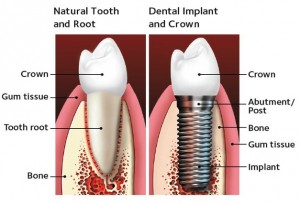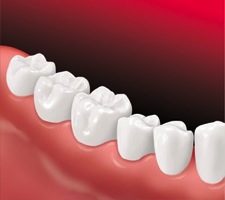Many patients choose implants to replace a single tooth, several teeth, or to support a full set of dentures. Implants are posts that are surgically placed in the upper or lower jaw, where they function as a sturdy anchor for replacement teeth. They are made of titanium (a strong, lightweight metal) and other materials that are accepted by the human body.
Most patients find that an implant is secure and stable—a good replacement for their own tooth. However, implants are not an option for everyone. Because implants require surgery, patients should be in good health overall. Patients either must have adequate bone to support the implant, or be able to have surgery to build up the area needing the implant. Patients also should be ready to commit to a daily oral care routine and to regular dental visits.
Chronic illnesses, such as diabetes or leukemia, may slow healing after surgery. Patients with these issues may not be good candidates for implants. Using tobacco can also slow healing. Your dentist can help you decide whether implant treatment is a good option for you.
What’s Involved?
There are many different kinds of implants. Treatment can take only one day, or it can take several months, or somewhere in between. Your dentist can outline a treatment plan that is most likely to be successful for you.
There are three general phases of implant treatment:
- Placement of the implant: The dentist surgically places the implant into the jawbone. There may be some swelling and/or tenderness after the surgery, so pain medication is usually prescribed to ease the discomfort. Your dentist may recommend a diet of soft foods during the healing process.
- The healing process: What makes an implant so strong is that the bone actually grows around it and holds it in place. This process takes time. Some patients might need to wait until the implant is completely healed, up to several months, before replacement teeth can be attached to the implant. Other patients can have the implants and replacement teeth placed all in one visit.
- Replacing your missing tooth or teeth (prosthesis): The dentist or a lab will custom-make a crown, bridge or dentures to fit your mouth and your implants. Once completed, the man-made teeth are attached to the implant posts.
The prosthesis usually takes some time to make. In the meantime, your dentist may give you a temporary crown, bridge or denture. This can help you eat and speak normally until the permanent replacement is ready.
Implant-Supported Bridge
Advantages of implants:
- An implant is most similar to a natural tooth.
- Nearby teeth do not have to be involved in the placement procedure.
- Implants may last for many years, even decades.
- Some types of implants and artificial teeth or dentures can be placed in just one or two visits.
- Implants may help prevent shrinkage of the jawbone from tooth loss.
Disadvantages of implants:
- Implants are not right for everyone, since they require surgery.
- Implant placement may take longer and may require more dental visits than other options.
- Implants may cost more than other treatments.




